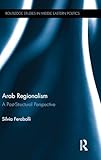Arab regionalism [Texte imprimé] : a post-structural perspective / Silvia Ferabolli
نوع المادة : نصالسلاسل:Routledge studies in Middle Eastern politics (Routledge, London)تفاصيل النشر:London ; New York : Routledge, 2015وصف:1 vol. (XVIII-201 p.) ; 24 cmتدمك:
نصالسلاسل:Routledge studies in Middle Eastern politics (Routledge, London)تفاصيل النشر:London ; New York : Routledge, 2015وصف:1 vol. (XVIII-201 p.) ; 24 cmتدمك:- 978-1-138-78780-3
- 337.61056090511 23E
- 337.A
| نوع المادة | المكتبة الحالية | المجموعة | رقم الطلب | رقم النسخة | حالة | تاريخ الإستحقاق | الباركود | |
|---|---|---|---|---|---|---|---|---|
|
|
Bibliothèque centrale En accès libre | Collection générale | 337.A / 470 (إستعراض الرف(يفتح أدناه)) | 1 | المتاح | 000006078409 |
Notes bibliogr.
"Arab regionalism details and examines the power relations involved in the making of an Arab region. On an empirical level, this book concentrates on the drawing of topographic and ideational boundaries in the Arab region, on Arab regional organizations, on the functional cooperation among Arab states and institutions, and on the socio-cultural infra-structure that supports the Arab region making process, with a strong focus on post-1990 dynamics. On a theoretical level, this work makes a case for the analytical autonomy of "Arab" regionalism (as opposed to regionalism in the Middle East or in the Mediterranean) and for the necessity of approaching it as an actual process instead of a failed project. The attitude of debasement and erasure towards Arab regionalism that is common-place in the field of regional studies is replaced in this book for the acknowledgment that there is much more political coordination, economic cooperation and social integration in the Arab region than has previously been assumed.Providing a fresh perspective on Arab regionalism, this book will be an essential resource for scholars and researchers with an interest in Regionalism, Middle Eastern Politics and International Relations. "-- Provided by publisher
"Arab regionalism details and examines the power relations involved in the making of an Arab region. On an empirical level, this book concentrates on the drawing of topographic and ideational boundaries in the Arab region, on Arab regional organizations, on the functional cooperation among Arab states and institutions, and on the socio-cultural infra-structure that supports the Arab region making process, with a strong focus on post-1990 dynamics. On a theoretical level, this work makes a case for the analytical autonomy of "Arab" regionalism (as opposed to regionalism in the Middle East or in the Mediterranean) and for the necessity of approaching it as an actual process instead of a failed project. The attitude of debasement and erasure towards Arab regionalism that is common-place in the field of regional studies is replaced in this book for the acknowledgment that there is much more political coordination, economic cooperation and social integration in the Arab region than has previously been assumed. Providing a fresh perspective on Arab regionalism, this book will be an essential resource for scholars and researchers with an interest in Regionalism, Middle Eastern Politics and International Relations"-- Provided by publisher
لا توجد تعليقات على هذا العنوان.


